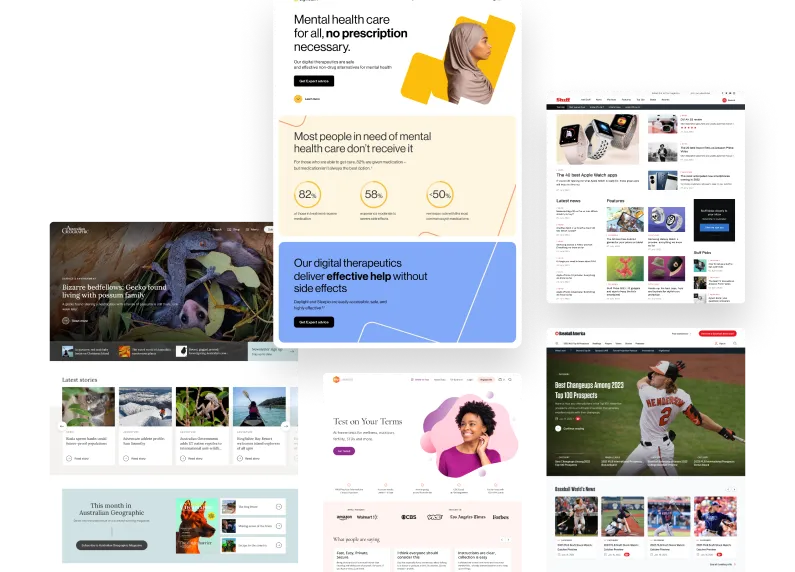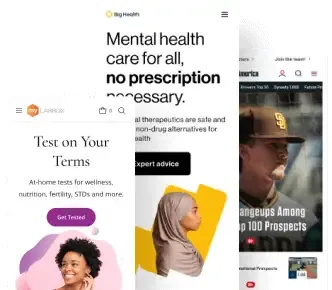You’ve likely experienced a web story by now – but do you know where this content came from? Learn about how Google has been driving the improvement of how we consume content, and how engaging content has never been more important!
Amit Sion interviews Paul Bakaus to explore the ongoing partnership that continues to drive web technology forward.
Transcript:
Amit
Google does some amazing things to help improve our experiences on the web. One that we’re all excited about is Web Stories, a powerful tool that helps publishers tell their story and engage their audiences. XWP had the honour to partner with Google on the development of Web Stories. And tonight, I have the pleasure to speak with Paul Bakaus, the Lead for Web Creator Relations at Google. Good evening and welcome to The XWP Tonight Show. We see the use of stories in Facebook, Instagram, and even LinkedIn. How does Web Stories compare to that?
Paul
Web Stories use the same tappable format that you’re used to. But really, there’s something quite different when it comes to the content that you find in Web Stories. So it’s not really about the same type of content that you find on Instagram, or Tiktok where, maybe you post a photo of what your dog had for breakfast.
But really Web Stories takes this immersive format, and take it to what you would publish on the web. You know, that could be an editorial story from a journalist from the New York Times, right? Or it could be a blogger, doing something really cool about his travel vlogging experience, right. But really, it’s a multi page story at a time, it has an end and a beginning. And it has more narrative to it. So in the end, that’s the most important thing when it comes to the storytelling aspect, the difference between those two, but then there are all sorts of differences that makes it more webby. So you get more control over what you can do with it.
The story just doesn’t delete itself, after 72 hours, you can put more content on it, you can have links on them, which is something that you might be missing on other platforms. And really the story becomes a part of your own website. It is in many ways, a different type of webpage that you monetize that you control that makes you money over time. And that I think there’s a very critical component of what makes it webby
Amit
In order to create a Web Story, first a person needs to be a good storyteller – which I think is key, that’s number one. But do you need to be a developer or designer? What sort of skills do you need in order to create Web Stories?
Paul
The great thing is you don’t need to be a developer. And that’s very good, because I think most of the important storytellers on the web are not always technical. A lot of them are amazing bloggers that have WordPress sites that have other CMS sites, but they don’t have a particular technical background. And it’s no surprise that there hasn’t been a lot of innovation in the blogging ecosystem.
For the last 10 or 20 years, we wanted to change that, we wanted to make it so that we create a new accessible format that everyone can use. And so we’re working together with a whole number of tool makers that create visual editors that can then be used either in your CMS of choice, or outside of your CMS, let’s say you have a custom website, and you still want to participate, you open that visual editor and you drag and drop together your story. Now, you do have to think about the design, though, because this story format is way more visual than maybe the blog posts that you were used to writing before. But most of the editors have integrated templates that you can work off from, and then you modify them to your needs.
Amit
For XWP, we work with a lot of different types of publishers and content creators, whether it be large News Corp organisations or nonprofits. What sort of web creators or publishers do you think would benefit from the utilisation of Web Stories?
Paul
Basically, everyone who’s trying to create content on the web. Now, I think there are different audiences that profit differently and need to monetize differently. For instance, if you are a travel blogger, you might benefit more from advertising, like a food blogger, you might benefit more from advertising, you might advertise on your blog, and that’s your main source of income. And we do have ads on Web Stores. But that ecosystem is still emerging.
But let’s say you’re a travel gadget or tech gadget reviewer, then maybe affiliate links are what matters to you. And it’s very easy to put affiliate links or brand deals on Web Stories, you control it. And so there are a number of areas here. And then of course, there are those who just simply are interested in the traffic. And that’s important too. If you want to funnel traffic to something that you’re selling, let’s say whether you’re a novelist, or whether you’re a nonprofit, Web Stories can really help with this because Web Stories is a very visible format on Google discover and on Google search as well. And so it’s an additional traffic source for your blog for whatever you want to do. So I think the applications are actually pretty broad, you just have to find out how to use it well.
Amit
So it can really help them to both engage—connect with the audience, but also find different ways for them to provide information to them. Is that the way that you see that the content creators would benefit from this as a long term utilisation of Web Stories?
Paul
Yeah, for sure. I think I would also encourage everyone to not just think of those stories as something social, right, that they publish, and then it’s out in the ether, and you do the next thing. But really, it is a way of modernising your own website, you can create those stories, and then you add to the corpus of content on your own website. And this kind of format is more engaging for current mobile consumers. We have proven this before, we have done a study with Forrester to show that this tappable format is preferred compared to existing blog posts. So I think it’s really worthwhile even on your own website, to make sure that you use Stories.
Amit
And for XWP, we’ve been very honoured to work with Google on the development of Web Stories for the last few years. If you can tell a bit about what was that involvement, in your view, of utilising XWP in collaboration with Google to develop Web Stories?
Paul
We are very happy partners. And of course, one of the most important things here is that we had a vision of what we wanted to do, we came in with an idea of an editor. But then having an idea for an editor and making it work for the WordPress ecosystem are two different things. But I think if we would have done this on our own, we might have ended up with an editor that in isolation works well, but doesn’t really connect to all the parts of your CMS that are important.
And so for us, it was very important to find a partner that really understands the WordPress ecosystem, and understands how the WordPress codebase works, how to connect to all existing parts of the codebase. And I think we managed to achieve that. I think, if you now use the editor, right? Now, you don’t have to think about how to publish, you click on publish, and it lands in your sitemap, it lands on your website. And there are all sorts of ways to integrate it on your homepage, in an archive. So I’m really happy about this collaboration overall.
Amit
One of the things I really love is that when XWP works with Google, it really feels like a true partnership. Because we’re building this together with you, but we’re actually really excited about what we’re building here, and we’re wanting everyone to adopt it, like we had that conference that we did last year at News Corp offices where Google came down and presented about AMP and Web Stories.. And we’re always speaking to our publishers about it. We are wanting them to know, “hey, here’s some of the latest technologies. And by the way, we’ve been working with Google and building that up”. So we really love that collaboration, that partnership with Google on these engagements.
Paul
Absolutely. I’m really glad for it too and I think this is key to the Web Stories success. I think agencies are often in the middle between the clients and adopting new innovative formats. So if we don’t have you, then we can’t actually do that.
Amit
Paul, thank you so much. It’s a pleasure to speak with you, a pleasure to work with you. And great to have you on The XWP Tonight Show.
Paul
Thank you so much for having me.
Amit
Thank you, everyone. We’ll see you next time.

